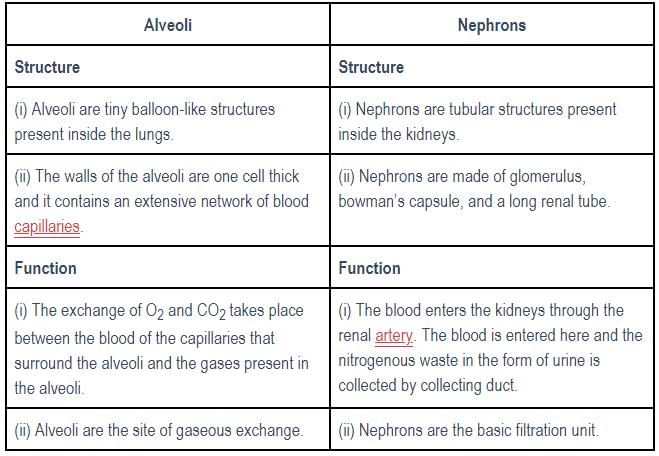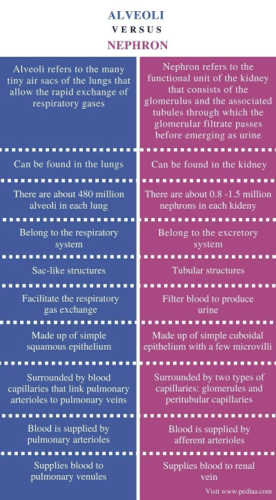Class 10 Exam > Class 10 Questions > Give four differences between the alveoli and...
Start Learning for Free
Give four differences between the alveoli and nephron on the base of structure and function ?
Verified Answer
Give four differences between the alveoli and nephron on the base of s...

 This question is part of UPSC exam. View all Class 10 courses
This question is part of UPSC exam. View all Class 10 courses
Most Upvoted Answer
Give four differences between the alveoli and nephron on the base of s...

Community Answer
Give four differences between the alveoli and nephron on the base of s...
Structure and Function Differences between Alveoli and Nephron
Alveoli:
1. Structure:
- Alveoli are small, hollow air sacs located in the lungs.
- They are tiny, thin-walled structures with a high surface area.
- Each lung contains millions of alveoli, which are surrounded by a network of capillaries.
- The walls of alveoli are composed of a single layer of epithelial cells and are surrounded by elastic fibers.
2. Function:
- The main function of alveoli is to facilitate the exchange of gases, specifically oxygen and carbon dioxide.
- Oxygen from inhaled air enters the alveoli and diffuses across the thin walls into the capillaries, where it binds to red blood cells.
- Carbon dioxide, produced as a waste product in cells, diffuses from the capillaries into the alveoli and is exhaled.
Nephron:
1. Structure:
- Nephrons are the functional units of the kidneys, responsible for filtration and urine formation.
- Each kidney contains thousands of nephrons.
- A nephron consists of a renal corpuscle (which includes the glomerulus and Bowman's capsule), a renal tubule, and a collecting duct.
- The renal corpuscle filters blood, while the renal tubule carries out reabsorption and secretion.
2. Function:
- The primary function of nephrons is to filter blood and regulate the concentration of various substances in the body.
- Filtration occurs in the renal corpuscle, where blood pressure forces fluid and small molecules through the filtration membrane into the Bowman's capsule.
- The filtrate then passes through the renal tubule, where reabsorption of water, ions, and nutrients takes place.
- The tubule also secretes waste products and excess substances into the filtrate.
- Lastly, the collecting duct receives the processed filtrate and concentrates it into urine, which is then excreted from the body.
Summary:
In summary, the alveoli and nephron differ in terms of structure and function:
- Alveoli are air sacs in the lungs responsible for gas exchange, while nephrons are functional units of the kidneys involved in filtration and urine formation.
- Alveoli have thin walls, surrounded by capillaries, while nephrons consist of a renal corpuscle, renal tubule, and collecting duct.
- Alveoli facilitate the exchange of oxygen and carbon dioxide, while nephrons filter blood and regulate the concentration of substances.
- Alveoli exchange gases between air and blood, while nephrons filter blood and produce urine.
Alveoli:
1. Structure:
- Alveoli are small, hollow air sacs located in the lungs.
- They are tiny, thin-walled structures with a high surface area.
- Each lung contains millions of alveoli, which are surrounded by a network of capillaries.
- The walls of alveoli are composed of a single layer of epithelial cells and are surrounded by elastic fibers.
2. Function:
- The main function of alveoli is to facilitate the exchange of gases, specifically oxygen and carbon dioxide.
- Oxygen from inhaled air enters the alveoli and diffuses across the thin walls into the capillaries, where it binds to red blood cells.
- Carbon dioxide, produced as a waste product in cells, diffuses from the capillaries into the alveoli and is exhaled.
Nephron:
1. Structure:
- Nephrons are the functional units of the kidneys, responsible for filtration and urine formation.
- Each kidney contains thousands of nephrons.
- A nephron consists of a renal corpuscle (which includes the glomerulus and Bowman's capsule), a renal tubule, and a collecting duct.
- The renal corpuscle filters blood, while the renal tubule carries out reabsorption and secretion.
2. Function:
- The primary function of nephrons is to filter blood and regulate the concentration of various substances in the body.
- Filtration occurs in the renal corpuscle, where blood pressure forces fluid and small molecules through the filtration membrane into the Bowman's capsule.
- The filtrate then passes through the renal tubule, where reabsorption of water, ions, and nutrients takes place.
- The tubule also secretes waste products and excess substances into the filtrate.
- Lastly, the collecting duct receives the processed filtrate and concentrates it into urine, which is then excreted from the body.
Summary:
In summary, the alveoli and nephron differ in terms of structure and function:
- Alveoli are air sacs in the lungs responsible for gas exchange, while nephrons are functional units of the kidneys involved in filtration and urine formation.
- Alveoli have thin walls, surrounded by capillaries, while nephrons consist of a renal corpuscle, renal tubule, and collecting duct.
- Alveoli facilitate the exchange of oxygen and carbon dioxide, while nephrons filter blood and regulate the concentration of substances.
- Alveoli exchange gases between air and blood, while nephrons filter blood and produce urine.
Attention Class 10 Students!
To make sure you are not studying endlessly, EduRev has designed Class 10 study material, with Structured Courses, Videos, & Test Series. Plus get personalized analysis, doubt solving and improvement plans to achieve a great score in Class 10.

|
Explore Courses for Class 10 exam
|

|
Similar Class 10 Doubts
Give four differences between the alveoli and nephron on the base of structure and function ?
Question Description
Give four differences between the alveoli and nephron on the base of structure and function ? for Class 10 2024 is part of Class 10 preparation. The Question and answers have been prepared according to the Class 10 exam syllabus. Information about Give four differences between the alveoli and nephron on the base of structure and function ? covers all topics & solutions for Class 10 2024 Exam. Find important definitions, questions, meanings, examples, exercises and tests below for Give four differences between the alveoli and nephron on the base of structure and function ?.
Give four differences between the alveoli and nephron on the base of structure and function ? for Class 10 2024 is part of Class 10 preparation. The Question and answers have been prepared according to the Class 10 exam syllabus. Information about Give four differences between the alveoli and nephron on the base of structure and function ? covers all topics & solutions for Class 10 2024 Exam. Find important definitions, questions, meanings, examples, exercises and tests below for Give four differences between the alveoli and nephron on the base of structure and function ?.
Solutions for Give four differences between the alveoli and nephron on the base of structure and function ? in English & in Hindi are available as part of our courses for Class 10.
Download more important topics, notes, lectures and mock test series for Class 10 Exam by signing up for free.
Here you can find the meaning of Give four differences between the alveoli and nephron on the base of structure and function ? defined & explained in the simplest way possible. Besides giving the explanation of
Give four differences between the alveoli and nephron on the base of structure and function ?, a detailed solution for Give four differences between the alveoli and nephron on the base of structure and function ? has been provided alongside types of Give four differences between the alveoli and nephron on the base of structure and function ? theory, EduRev gives you an
ample number of questions to practice Give four differences between the alveoli and nephron on the base of structure and function ? tests, examples and also practice Class 10 tests.

|
Explore Courses for Class 10 exam
|

|
Suggested Free Tests
Signup for Free!
Signup to see your scores go up within 7 days! Learn & Practice with 1000+ FREE Notes, Videos & Tests.

























